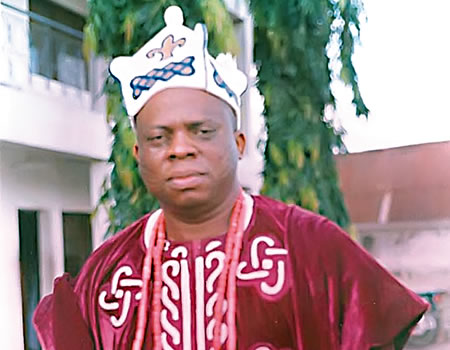Oba Sunday Oladapo Oyediran, ‘Lagbami Osekun III, the Onpetu of Ijeruland in Oyo State, recently marked 20 years on the ancient throne of the Oje people. In this interview by SAM NWAOKO, he speaks on the need for Yoruba sons and daughters, especially the Olu Oje to know their history. Excerpts:
Your Majesty, 20 years on the throne must have felt differently and remarkable. Comparing the beginnings and now, how would you say it has been?
Twenty years have been very interesting, challenging and very eventful but I must say God has been very kind and faithful to me. Although I passed through some turbulent time, when I compare mine with the outset of some traditional rulers who were enthroned before me, I found that mine was better. Oba Sikiru Adetona, the Awujale of Ijebuland told us one day that his first 25 years on the throne were rough. The Alaafin, Oba Lamidi Adeyemi corroborated that fact, he said that his own first 25 years on the throne too were rough. For me, I can say that my first 17 years were rough because there was no assistance; people did not understand what I came to do on the throne because my philosophy of being on the throne was different from what people had taken to be their own philosophy. I have always seen the position of leadership, be it that of Oba, president or chairman of an association, as position of service. So people find it difficult when I push them hard to support my vision and drive for the community. It was strange to them. So, I found it extremely difficult in the first 17 years but today, I can say to God be the glory because people are getting to understand what I meant and they are willing to support the vision I had for the community. So it has been very interesting and challenging.
What examples would you cite as eventful events that shaped those ‘challenging and eventful’ 17 years?
When I came, I analysed the development of my area. I discovered that we had nothing. There was no government presence; state government, none; federal government, none. There were neither federal nor state government establishments. The only thing we could say we had was just the local government structure. That was the only thing I met on ground, and the way the local government structure was being run then was terrible. You could see that the people at the helm of affairs were interested only in what they could accumulate for themselves and not what they can do for the community or what they can do to improve on the existing structures. When I began to educate the people that we are disadvantaged, let us sit down and see how we can bring development to our area, they asked me if I wanted to divide the town into two. They would say ‘we are all Ogbomoso, don’t divide us into two’. I would explain that I was not out to divide Ogbomoso, that we have Ogbomoso North Local Government and Ogbomoso South Local Government, Ogbomoso North is developed, Ogbomoso South is not.
Let us look at what we can do to develop our own local government too. That was my message. During the enumeration for the 2006 population census, I tried everything possible to improve what I met on ground. But when the result came out, I discovered that there was still ridiculously low compared to Ogbomoso North. I went to the officials at the population board to ask why the figure was that low, with all the mobilisation and sensitisation we did. The man asked me: How many hospital bed spaces do you have in Ogbomoso South? As at that time, there was none. He said ‘How many government offices do you have?’ I said none. He said ‘well Kabiyesi, what happened is that people come to sleep in your place, they go to work during the day time and the census we did was done during the day time. So, most of them would have been registered at Ogbomoso North, putting you at a disadvantaged position.’ This was a fact. Those were the type of problems I was trying to let the people understand so that we would know how to address them. Instead, they were just accusing me of trying to divide the town. Interestingly, those who were benefitting from that lopsidedness were the ones instigating my people, saying ‘your Baba wants to divide the town into two and we will not allow him.’ And it was simply because they were benefitting; but I thank God things are changing today.
When you say ‘my people’, how do you define those who are your people?
When government came up with the idea of setting up a traditional council, they made sure that they put you in charge of one particular area. Traditionally, if I am to go by what we used to do before the creation of Local Government Traditional Council, I was controlling chieftaincy in Ogo Oluwa Local Government Area and Ogbomoso South. It’s only those of my people, because there were princes and princesses that are on our land in Orire Local Government, there were no chiefs or Baales there and that was why we did not have any traditional council there. So, when the government came it said ‘Onpetu, you are now in charge of Ogbomoso South Local Government Traditional Council, you don’t need to interfere in Ogo Oluwa Local Government Traditional Council. All the chiefs that belonged to you are now under Ogo Oluwa Local Government Traditional Council.’ Based on that development, when I now talk of my people, I restrict myself to Ogbomoso South Local Government, because we are talking about development here. However, that does not mean that I have jettisoned my people in Ogo Oluwa Local Government or my people in Orire Local government.
Kabiyesi, it is a common belief that your people are found everywhere in Yorubaland, while some are with you in Ogbomoso South Local Government Area of Oyo State. There are Oje people all over the world, as stated by some historians. What are you doing to knit Oje children to their common ancestry?
We are currently on a project to achieve that. We started a project in 2004 we called Oje People in Diaspora. We try as much as possible to reach out to them and we have not been able to exhaust their list. We are still working. We are focussed on documenting Olu Ojes in Diaspora and it will interest you that in the course of looking for them, we stumbled on a fact that the Agura of Gbagura is an Olu Oje man. I sent emissaries to him. When they took our invitations to him, I think it was the Ekerin Gbagura that told my envoys that ‘we know that we came from Igbo Oje in Ijeru. We know, and here we have Oje Ile, we have Oje Oko; so the invitations you brought here are not enough.’ The man said we had addressed the Agura lone, what about the Olu Oje people, the ones at home and the ones in the villages? He also said ‘then you have to bring another one for Baba Obasanjo because he is the Oluwo Olu Oje’. I said ‘but Baba Obasanjo is an Owu man?’ He said ‘yes, his mother is an Olu Oje woman.’ I was wowed! Before then, I was thinking it was the Chief M.K.O. Abiola’s family alone that was Olu Oje people. I now know that Agura Gbagura, as it is today, is an Olu Oje man. In my book entitled Tokuloje, there are references to some of our findings about the Olu Oje in Diaspora. I was told that out of 14 Baales that are in Gbogan, 11 of them are Olu Oje. Invariably, the owners of Gbongan have been identified. So, those are some of the interesting discoveries we are making. Recently, the Delesolu Family in Oje, Ibadan did Olu Oje Descendants reunion. They limited it to the people they know, but I sent some of my chiefs and some princes to Ibadan to attend the ceremony. It was when they got there that we discovered that my photograph was even in their programme as their father. I was not even formally informed about the event, but when we sent emissaries to them for my 20th coronation anniversary, they told them of the reunion. During the reunion, they met Olu Oje people that came from Badagry. They also met the ones that came from Benin Republic, and they were all eager to know their cognomen. There was a lecture delivered by one of them and when I read the work, I concluded that the man must have read my book. My chiefs then confirmed that the lecturer said he had met me and that we had a discussion. So, that is the work we are doing, reconnecting and fostering unity.
I love borrowing good ideas. The Owu people are now having an annual convention. I am working towards having Olu Oje annual convention that will hold yearly for us to discuss our lineage and dynasty. We understand that we are now indigenes of wherever we are residing, we are not saying leave where you are but we are saying know where you are coming from. Know your history, know your brothers. Know your sisters. That is what we are working at. We can be of good use to ourselves.
Based on this scenario and given the extent of the Olu Oje kingdom that you have enumerated, what is the relationship between you and other traditional rulers, since it is possible that many more than you know could be Oje children?
I have an open mind to receive any progressive traditional ruler who is ready to serve his community. Either you are an Olu Oje or not, once you have that progressive mind, you are welcome to associate with me. Secondly, there is nothing bad in Olu Ojes being the traditional rulers in their domains; there’s nothing bad in that. We just need to be meeting and discussing our dynasty. Look at what is happening now, no matter how small an Owu town or community is, they now have a king. They have kings who are wearing beaded crowns. All Owu settlements are headed by kings. This was achieved when Chief Olusegun Obasanjo was the president. He used his position to bring them together. I have an Olu Oje who is a governor now. He knows himself. I have an Olu Oje who is an SSG. They should use their positions to bring the Olu Ojes together; they should join hands with me in the efforts to bring the Olu Ojes together so that we can move ahead. When we know ourselves, we would be able to help ourselves and progress together.
WATCH TOP VIDEOS FROM NIGERIAN TRIBUNE TV
- Let’s Talk About SELF-AWARENESS
- Is Your Confidence Mistaken for Pride? Let’s talk about it
- Is Etiquette About Perfection…Or Just Not Being Rude?
- Top Psychologist Reveal 3 Signs You’re Struggling With Imposter Syndrome
- Do You Pick Up Work-Related Calls at Midnight or Never? Let’s Talk About Boundaries






